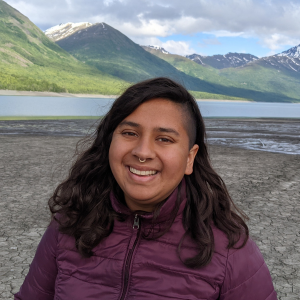Sangeeta Sarkar – Political and Community Organizer, Save the Bay

As an organizer at Save The Bay, Sangeeta (pronouns: they/them) works toward a climate resilient Bay Area through organizational relationship-building and advocacy. Their recent transition into the nonprofit sector has allowed them to combine their community organizing background with their passion for environmental justice. Prior to Save The Bay, Sangeeta worked in the medical device industry. They continue to be active in community spaces, and they’re a proud member of the Alliance of South Asians Taking Action (ASATA). When they’re not organizing, you can find Sangeeta hiking, baking, or spending time with their two cats.
What is the educational and career path that led to your current career?
I took a really circuitous path to the environmental field! I’ve been organizing around environmental issues since I was a senior in college, when I joined protests against the Dakota Access Pipeline. Shortly after, I completed my Bachelor’s and Master’s degrees in Bioengineering and moved to the Bay Area to start working in the medical device industry. In parallel, I was active in community organizing with ASATA, including leading our contingent at the Rise for Climate, Jobs, and Justice mobilization in San Francisco. A couple of years later, I decided to make a career pivot and focus on organizing full-time. Save The Bay happened to be looking for an organizer at that time, and here we are almost a year later!
How did you become interested in environmental work?
Honestly, I’d kept my distance from the environmental movement for a while. I saw it as something that was dominated by wealthy white people, and had little relevance for working-class communities of color. This was before I understood environmental justice, and the numerous issues that disproportionately affect communities of color and the Global South. As I learned more about pipeline protests, the Flint water crisis, and climate colonialism, I became more interested in environmental work. I’m now a firm believer in an environmental movement that’s led by BIPOC (Black, Indigenous, and people of color) folks, for the benefit of everyone.
What environmental issues are of most concern to you?
I’m very concerned about the exposure of communities of color to toxins, and the resulting detrimental health impacts. For example, I was shocked to learn about the toxic legacy of uranium mining in the Navajo Nation by the US government. We don’t have to look that far for examples, though – there are toxic sites all over the Bay Area, and grassroots organizations like Greenaction and Communities for a Better Environment are working on cleaning them up. I’m concerned about how toxin exposure will worsen with climate change, and interested in seeing how environmental groups can support the cleanup of these toxic sites.
What are your suggestions on how WEN members can become more involved in your sector of the environmental movement?
My sector, and the environmental movement as a whole, are starting to recognize and act in solidarity with indigenous peoples (the original environmental stewards!). For me, the first step in this process was finding out whose land I’m occupying – the native-land.ca interactive map is a great resource for this. After that, you can see if any indigenous groups are active in your area and what kind of allyship they’re looking for (land tax, volunteering, etc.). If you’re in the East Bay like I am, definitely check out the Sogorea Te’ Land Trust’s amazing work and pay your Shuumi Land Tax!
Connect with Sangeeta on LinkedIn.
Connect with Save the Bay on LinkedIn.
